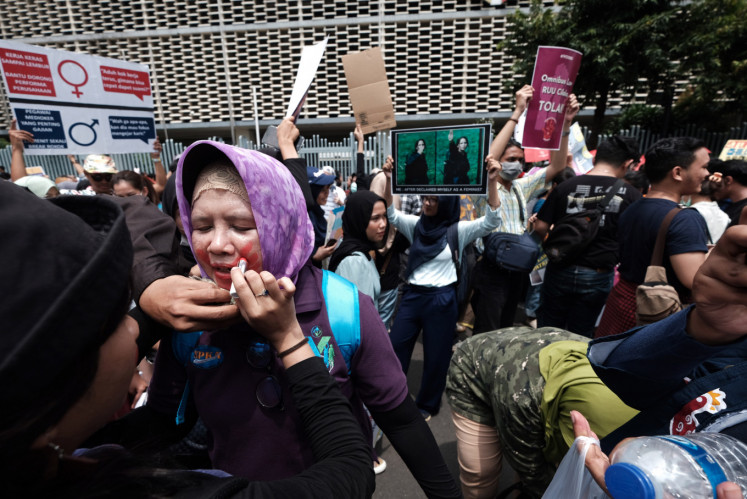Popular Reads
Top Results
Can't find what you're looking for?
View all search resultsPopular Reads
Top Results
Can't find what you're looking for?
View all search resultsYoung Indonesian men today less uncomfortable around higher-earning women: Economist
Many of today’s women are not doubtful about their competence when given an opportunity for higher income and/or responsibility. What they are not confident about is the spouse and family support as men, particularly of the older generation, still lack confidence when their wives earn more.
Change text size
Gift Premium Articles
to Anyone
Indonesian men in their 30s are beginning to feel more comfortable with women earning more than them, an economist has said.
Aviliani of the Institute for Development of Economics and Finance (INDEF) told a discussion on Dec. 18 that, contrary to widely held assumptions, many of today’s women are not doubtful about their competence when given an opportunity for higher income and/or responsibility.
“What they are not confident about is the spouse and family support” as men, particularly of the older generation, still lack confidence when their wives earn more.
Men born after 1990 were more likely than older men to regard women as equals, Aviliani said.
The 1974 Marriage Law legalizes the traditional view that men are breadwinners, as it states, “the husband is the head of the household and the wife is a housewife”.
Read also: 'Feminism is not for Indonesia’: Conservative Muslims' recipe for women's empowerment
Aviliani was addressing the third anniversary of the Indonesian Business Coalition for Women Empowerment (IBCWE), which has 20 corporate members.
Other speakers at the event included participants of role plays staged in businesses called “Women take over: Leading in a day”, facilitated by the IBCWE, in which female staff members tagged along female leaders and acted as their bosses for a day.
Meida Kurniawati, a staff member at publicly listed garment manufacturer PT Pan Brothers, and Dossy Irani, a marketing sponsorship staff member at taxi operator PT Bluebird, also said women’s doubts about seeking income and developing a career stemmed mainly from family and society rather than their own ability or lack thereof.
Meida said she found that being emotional, considered a weakness of women, could be turned into a strength.
She cited study results showing high emotional intelligence as a preferred leadership trait. “Being emotional can be positive, not just being angry”, Meida said, referring to the stigma of temperamental female bosses. Women’s strengths included the willingness to share and show empathy, she said.
Read also: More than a woman in business: Shinta Kamdani talks leadership in economy
Dossy said that, while tagging along Bluebird director Noni Poernomo and having to “take over” her responsibilities for a day, she noticed Noni’s energy and communication skills in managing the taxi company from early morning to evening before meeting her children. Such energy and skills, Dossy said, looked essential not only in a male-dominated company but also in navigating the family-owned business. Though it looked very tiring, Dossy said, it also motivated her to progress in her career.
A study published last July in the Bulletin of Indonesian Economic Studies revealed that women’s workforce participation remained stagnant at around 51 percent from 1996 to 2013.
A 2014 report from the World Bank showed that only 9 percent of top managers at private firms in Indonesia were women, though more women are filling management positions, other surveys show.
Read also: In ASEAN, gender equality still very much a 'tick-the-box' issue
On Dec. 18, three IBCWE members were presented certificates for gender equality: Lifestyle retailer PT Mitra Adiperkasa, tire maker PT Gajah Tunggal, both publicly listed, and textile and garment manufacturer PT Dan Liris.
The certificate, called Economic Dividends for Gender Equality (EDGE), is based on a global assessment methodology and business certification standard for gender equality. The standards include equal pay for equal work and gender balance in junior level recruitment to top management.
Gajah Tunggal director Catharina Widjaja told The Jakarta Post she was motivated to have the company strive for gender equality so that men and women “could complement each other” in the male-dominated business. Though highly challenging, the male staff were “curious”, she said, in the firm’s subsequent efforts to promote and recruit women amid the stereotype that women are largely uninterested in science and manufacturing.
“Some of the men have daughters, and they also hoped their girls could get more opportunities” to pursue careers in science, technology, engineering and mathematics, Catharina said.
Women participates in the international women's day 2020 in Sarinah, Central Jakarta, on Sunday 8 March 2020. The community demands gender equality rights on international women's day, and rejects Omnibus Law. (JP/Donny Fernando)While some of the female staff declined promotions over fears of struggling to juggle career and family, Catharina said support from the IBCWE was crucial to help management continue to show support for working mothers. Among other things, the firm has a breastfeeding room and daycare center.
Meanwhile company leaders Erik Meijer of Telkomtelstra and Suresh Subramanian of Kantar Indonesia said they had found that investing in more encouragement for women was “good for business”. Diversity brought new ideas, Subramanian said.
Meijer said that, contrary to the widespread perception that women often asked for leave to tend to family matters, his female staff were very hesitant to ask for such permission compared to the men.











